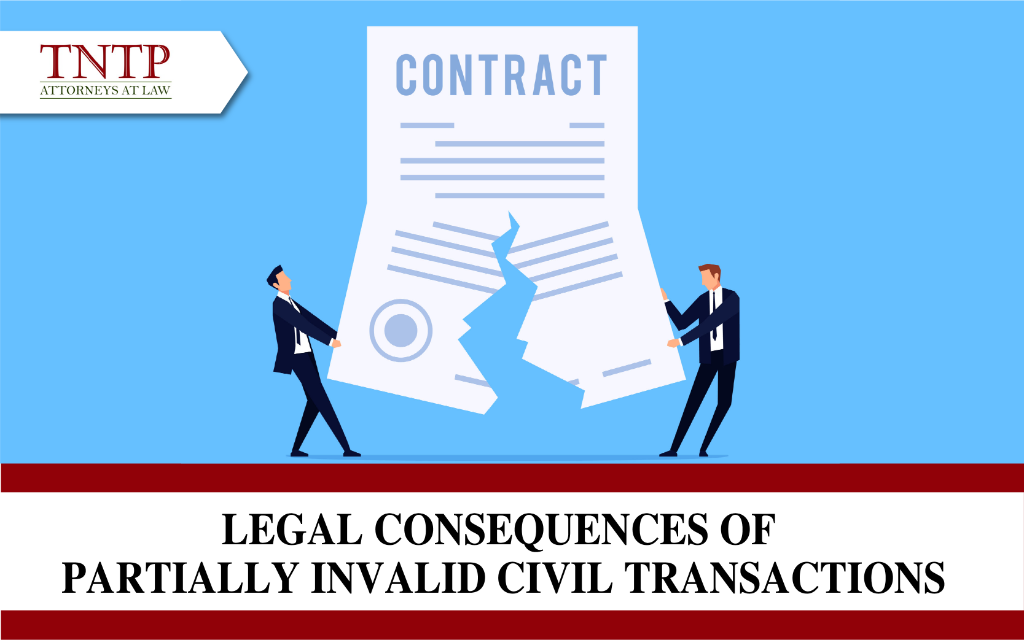Legal consequences of partially invalid civil transactions

Civil transactions need to satisfy certain conditions of the law to be valid. However, due to many reasons, one of the parties has performed improperly or inadequately those conditions, which results in the invalidity of the established civil transaction. Invalidity is divided into total invalidity and partial invalidity, let find out partially invalid civil transactions with TNTP.
1. Partially invalid civil transactions
- A civil transaction shall be partially invalid when one part of the transaction is invalid but does not affect the validity of the remaining parts.
- A civil transaction shall be invalid if it does not satisfy one of the conditions regulated in Article 117 of Civil Code 2015 unless otherwise stipulated by Civil Code. For example, a civil transaction must be established in writing following regulations, but if that written form does not comply with the provisions of law, it is considered invalid due to a violation of the form conditions. However, if one party or the parties has performed at least two-thirds of its obligations in a transaction, at the request of one party or parties, Court shall issue a decision to recognize the validity of that transaction.
- The content of a civil transaction may include many issues such as subject matter, time, location, price, payment method, rights and obligations of the parties, etc. If there is a violation of Article 117 of Civil Code 2015, that content will be invalid, and the rest will remain in effect (binding the parties).
- A partially invalid transaction is usually a transaction whose subject matter includes many different things or different acts. Because the subject of the transaction is mistaken or the subject does not have the right to dispose of all the objects in the transaction (the object is not under the ownership of the subject or is under multiple ownership without the co-owner’s consent), the part of the transaction related to these objects is invalidated, while the other parts are still valid.
- For example, according to Civil Code 2015, except for special cases, the rate of interest for a loan agreed by the parties may not exceed 20% per year. In case the parties sign a contract for loans and agree on an interest rate exceeding 20%/year of the loan amount, the excess interest rate will not take effect and other contents of the contract will still be valid if they comply with Article 117 of Civil Code 2015.
2. Legal consequences of partially invalid civil transactions
- Regarding the time of invalidity of the transaction: When a civil transaction is partially invalid, the invalid content will not give rise to, change or terminate any civil rights and obligations of the parties related to such content from the time when the transaction is established.
- Regarding the responsibilities of the parties: The parties shall restore the original state and return to each other what was received within the scope of the invalid content. In case it is not possible to return it in kind, it will be converted into money for a refund. The return of the object or money will depend on the parties’ agreement. If no agreement is reached, in principle, with the subject matter of the transaction being an object, then the receiving party is obliged to return the received object (intact) to the obligee when the content of the transaction is invalid.
The parties are obliged to implement the remaining effective contents, in case of failure to perform the obligations properly and fully, they will be subject to corresponding sanctions, which may be compensated for the damage, fines for violations…
The bona fide third party in receiving yield and/or income is not required to return such yield and/or income. The bona fide third party is a party who does not know or cannot know the contents of the invalid civil transaction; yield is a natural product that property brings; profit is the income earned from the exploitation of the property.
- Regarding the compensation for damage: The party at fault causing damage must compensate, the compensation will be calculated according to the law based on the parties’ agreement and the actual damage that occurred.
3. Resolutions for the partially invalidated civil transactions
- When a part of a civil transaction is invalid, the parties need to agree to amend the terms related to the invalid content, in case of failure to reach an agreement, the parties shall comply with the provisions of the law on consequences of partially invalid civil transactions;
- Resolve the arising issues related to invalid content such as compensation for damage to the infringing party, restoration of original rights and interests;
- If the invalid content affects the implementation of the remaining contents, the parties should agree, establish and enter into a new civil transaction with more correct and sufficient content;
- In case the parties need legal advice and support on the content of a civil transaction, you can contact us for timely and effective support.
Above is the article “Legal consequences of partially invalid civil transactions”. We hope this article was useful to you.
Best regards,


